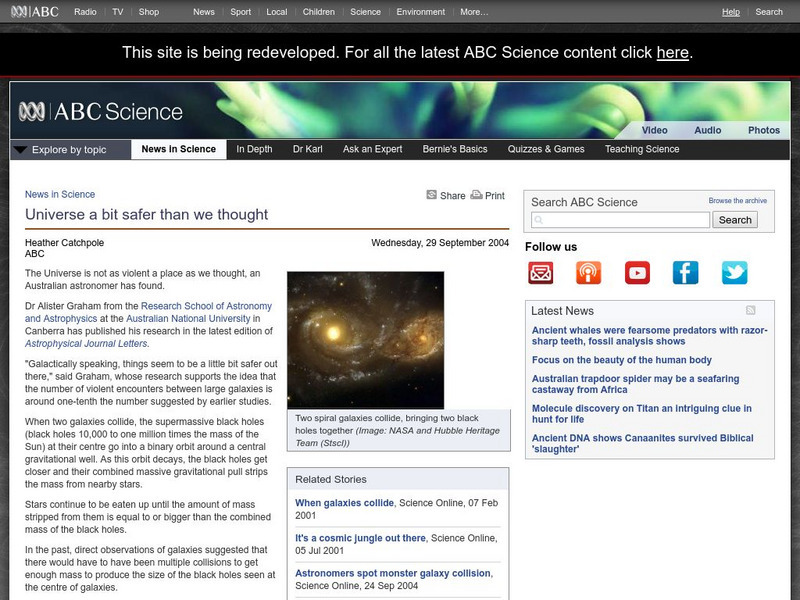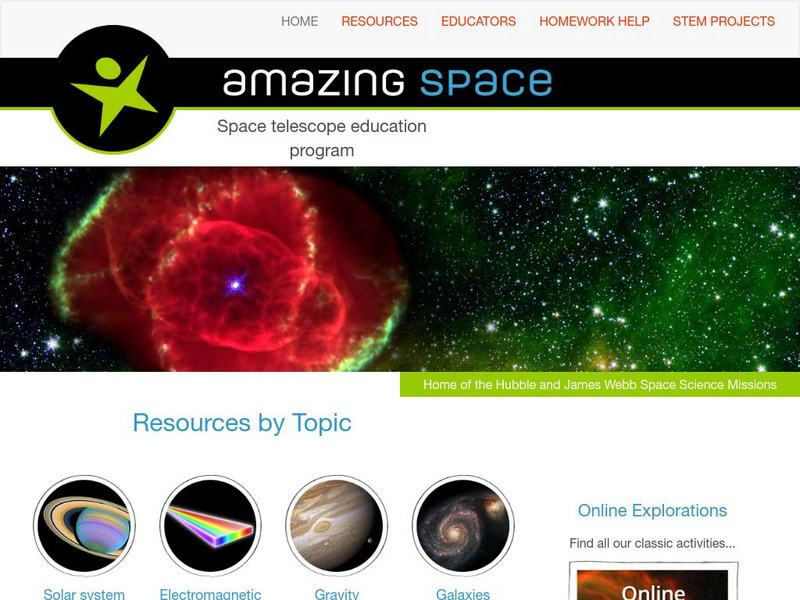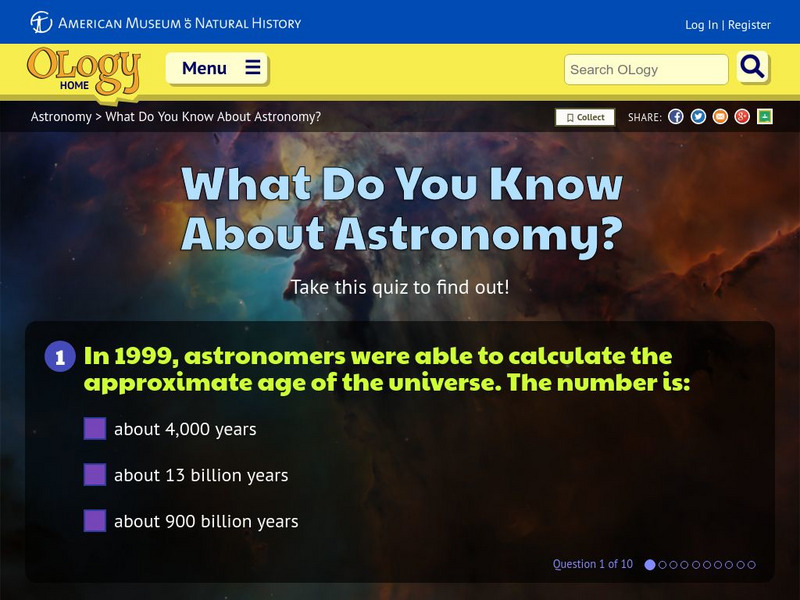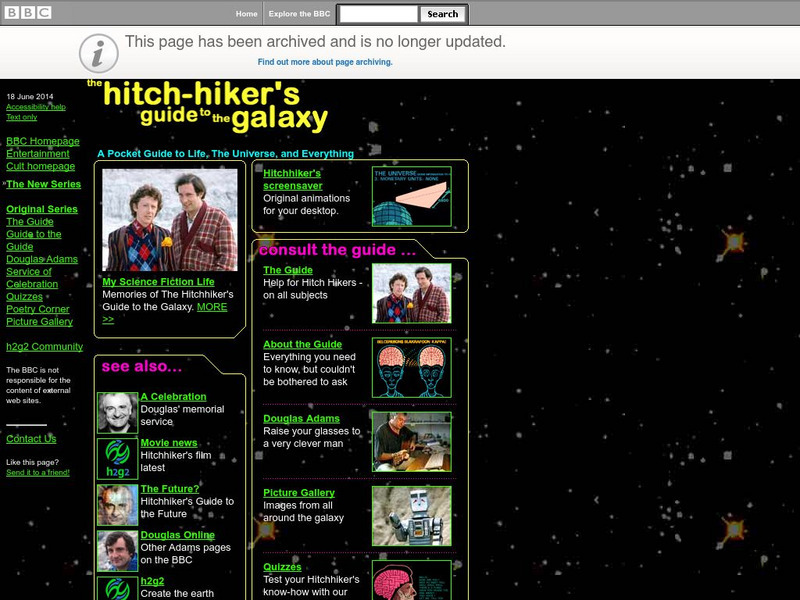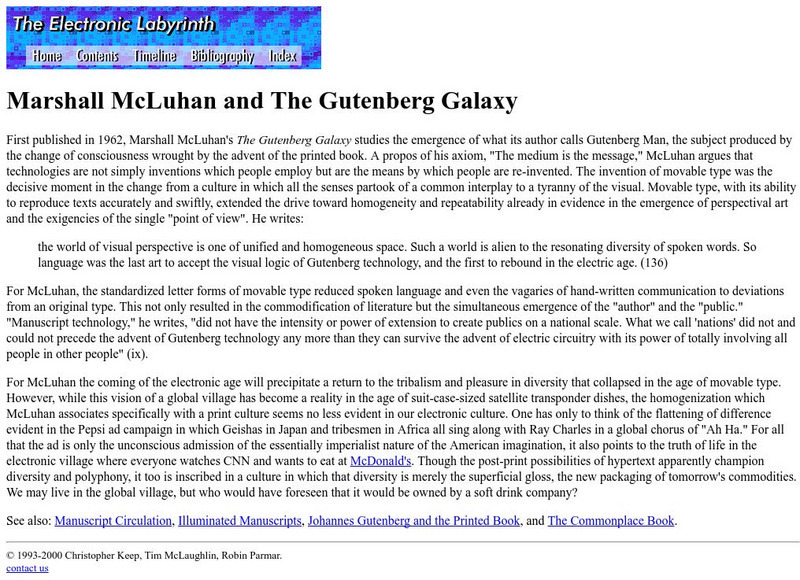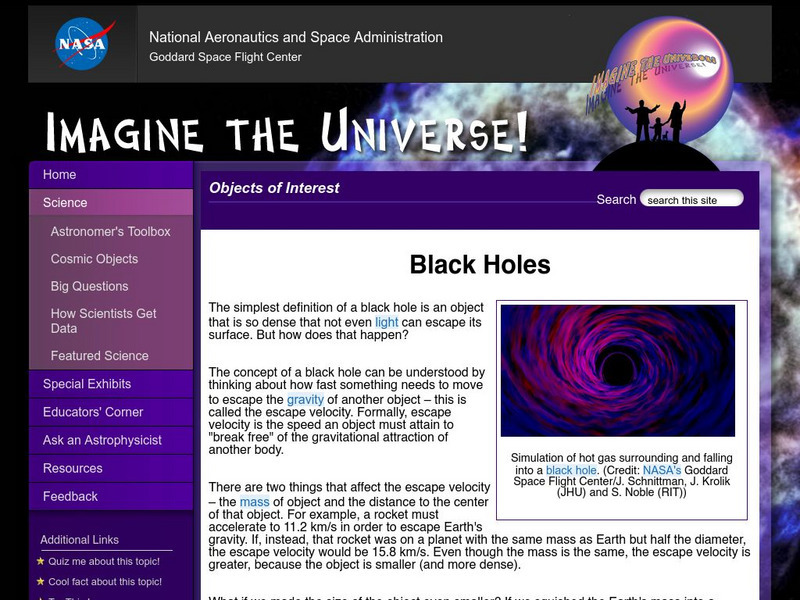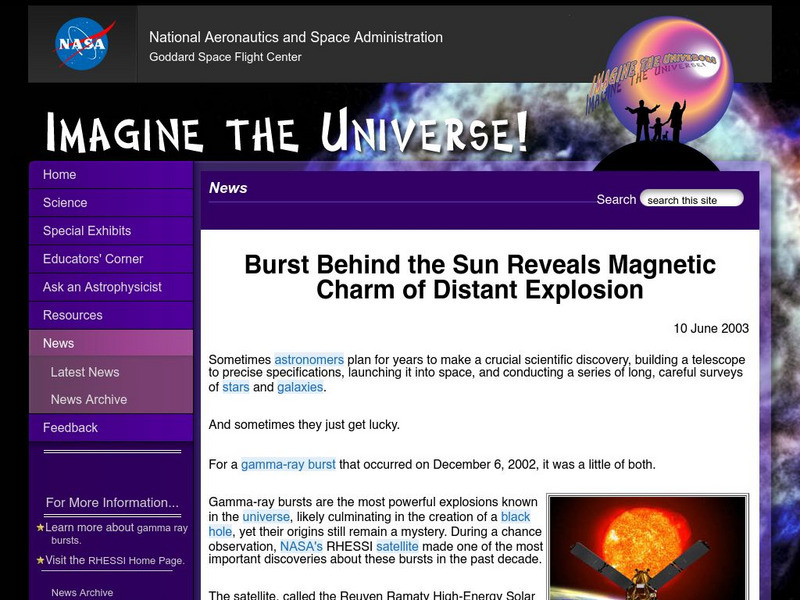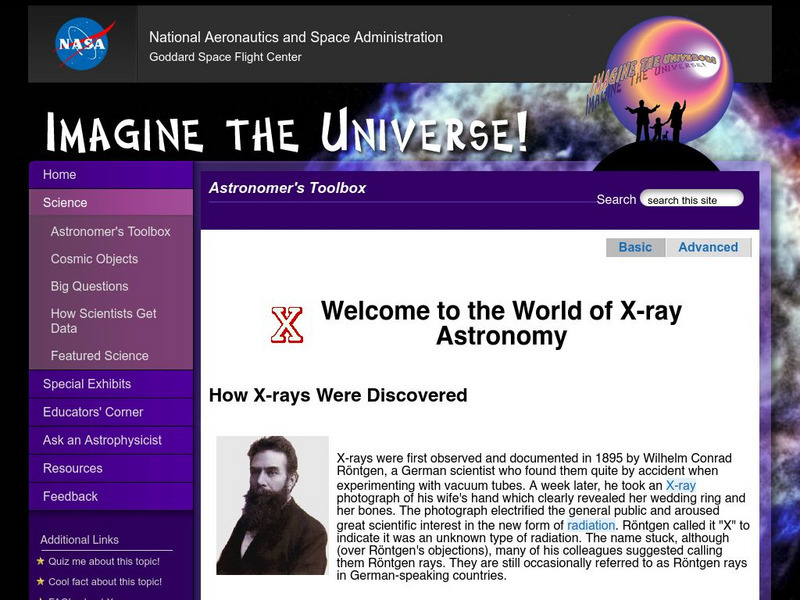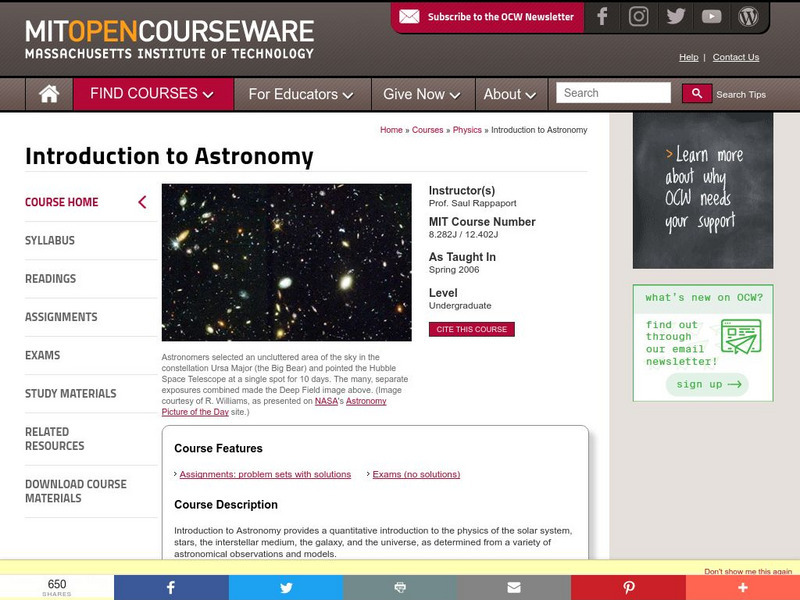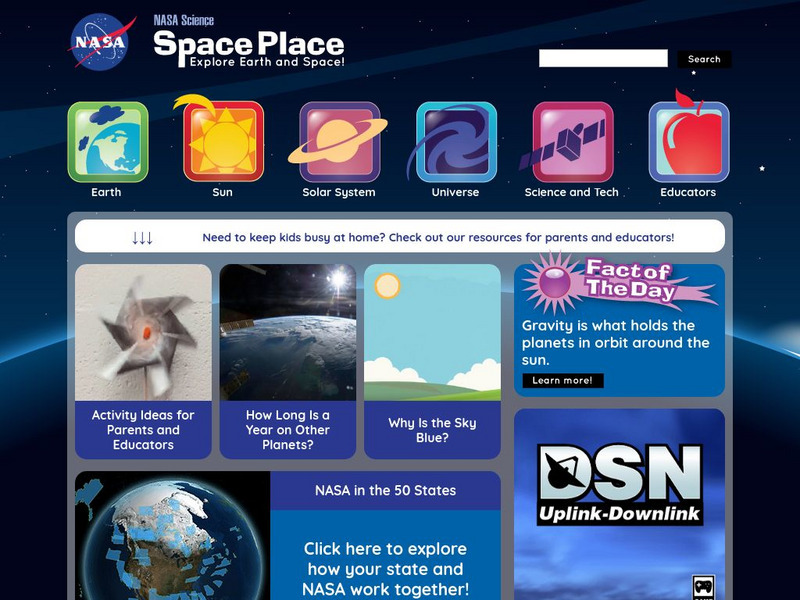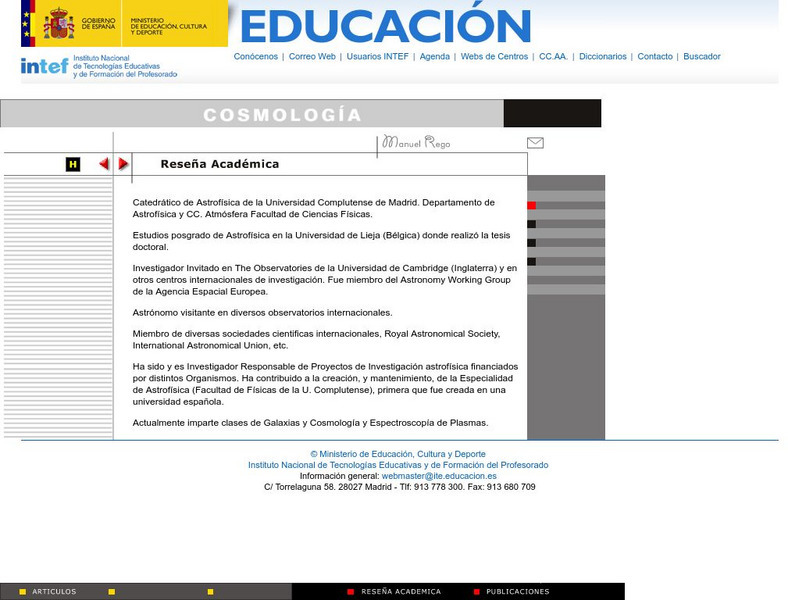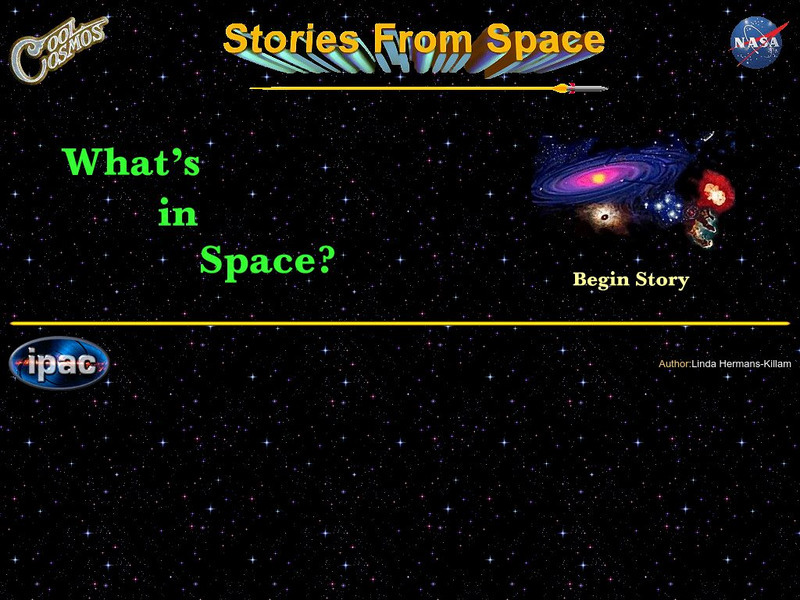University of Wisconsin
University of Wisconsin: The Constellations and Their Stars
An excellent site dedicated to the constellations and information about the objects which make them up. Contains a great deal of information about various stars, galaxies and other objects, as well as details on how best to observe them.
Natural History Museum
Natural History Museum: Our Place in the Universe
Part of a larger online exhibit on the moon and space, this site deals with one's place in the universe. The topics covered include the sun and solar system, the galaxy, and the universe.
Other
University of Alabama: M31: The Andromeda Galaxy
View satellite photographs of the Andromeda Galaxy.
Australian Broadcasting Corporation
Australian Broadcasting Corporation: News in Science: Universe a Bit Safer Than We Thought
From ABC News in Science, Heather Catchpole's article explores issues related to the collision of galaxies and the subsequent formation of black holes.
Other
Astromador: Astronomia Para Amadores
This resources focuses exclusively on astronomy. It's packed with historical facts about space exploration, famous people who pioneered the study of stars and planets. It features chronological list of space exploration, current news,...
Space Telescope Science Institute
Space Telescope Science Institute: Amazing Space
Amazing Space promotes the "science and majestic beauty of the universe for use in the classroom." Here you can find learning activities, lesson plans, teaching guides, and helpful tips for students eager to learn about space and space...
American Museum of Natural History
American Museum of Natural History: O Logy: What Do You Know? Astronomy
Take this ten-question self-scoring quiz to test your knowledge of astronomy facts: age of the universe, why stars and planets are spheres, where other life might exist in the outer space, the Milky Way, and more.
Other
Astro Mia: Tierra, Sistema Solar Y Universo
This site is a good resource to study Astronomy. It has six sessions: the Universe, the solar system, the earth and the moon, history of Astronomy, articles, famous astrologers and a glossary.
NASA
Viewing the Violent Universe: What Are Gamma Rays?
The universe produces a broad range of light, only a fraction of which is visible to our eyes. Gamma rays are nonvisible light, which also includes x-rays, ultraviolet light, infrared radiation, and radio waves.
Curated OER
Astro Lab: Space, a Contemporary Vision of the Universe
Explore how our contemporary understanding of the universe came to be. This overview looks at the history of three main areas of study, namely space, time, and the arrangement of matter.
European Space Agency
European Space Agency: Esa Kids: Our Universe: Supernovas
A basic overview of supernovas. Links to more information about starts, planets and other objects in our solar system and galaxy are included.
BBC
Bb Ci: The Hitchhiker's Guide to the Galaxy
Fun site containing information about the world created by the book. Also contains links to information on the author, Douglas Adams.
University of Virginia
Univ. Of Virginia: Electronic Labyrinth: Marshall Mc Luhan and Gutenberg Galaxy
This brief article explores Marshall McLuhan's argument that the electronic age would be the key to restoring the depth of diversity that the print age had destroyed. Plenty to think about.
NASA
Nasa: Imagine the Universe: Black Holes
Learn what black holes are and the myths that surround them.
Other
University of Cambridge: Astro Adventure
Imagine a time when you can travel through space, planet to planet, cheaply and in comfort, when you can take a trip to the stars as your next holiday. Well, imagine no more. Learn more about the solar system as you take this trip of a...
NASA
Nasa: Imagine the Universe: "Burst Behind the Sun"
Site provides the article, "Burst Behind the Sun Reveals Magnetic Charm of Distant Explosion," that details on a gamma-ray burst that occurred on December 6, 2002. Provides graphics and links to learn more about gamma-ray bursts.
NASA
Nasa: Imagine the Universe: The History of Gamma Ray Astronomy
This NASA article discusses the history of gamma-ray astronomy. Related resources.
NASA
Nasa: Imagine the Universe: Welcome to the World of X Ray Astronomy
Site recounts how X-rays were discovered as well as who discovered them. Offers graphics, links to facts on this topic, a quiz, and teacher resources.
Massachusetts Institute of Technology
Mit: Open Course Ware: Courses: Physics: Introduction to Astronomy
A university-level introduction to basic astronomy. Includes course readings, assignments, exams, and study notes with links to images and to biographical profiles of famous astronomers.
NASA
Nasa: Image Science Center: Ask the Space Scientist
A NASA scientist, Dr. Sten Odenwald, answers many students' questions. Topics include planets, galaxies, black holes, the origin of the universe, and common misconceptions about space.
NASA
Nasa: Star Child: Elementary Astronomy Unit
Learn everything you can about outer space with this interactive astronomy unit. 2 levels of difficulty with modules on the solar system, the universe, other "space stuff" and a glossary of terms. Links for parents and other great website.
NASA
Nasa: Astronomy Picture of the Day: Edwin Hubble 1889 1953
Part of the NASA website, this is a reprint of an article in the Journal of the Royal Astronomical Society of Canada about Edwin Hubble's life and accomplishments, stressing his role in the development of modern astronomy.
Ministerio de Educación (Spain)
Ministerio De Educacion: Cosmologia
This site has many articles from the first moments of life of the universe to its properties, current models, black holes, galaxies, etc.
California Institute of Technology
Cal Tech: Stories From Space: What's in Space?
Through this story you will be introduced to outer space: stars, the Milky Way, planets, the Solar System, the Sun, clouds of dust and gas, galaxies.





